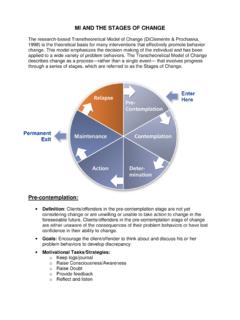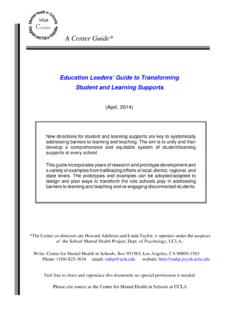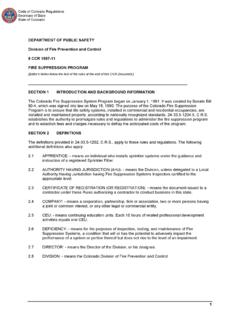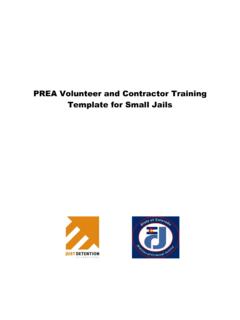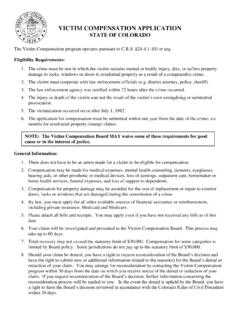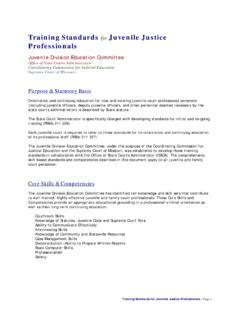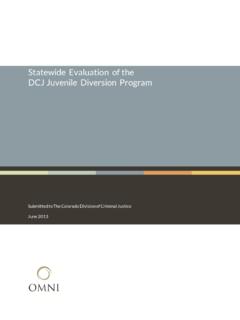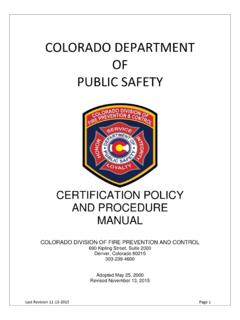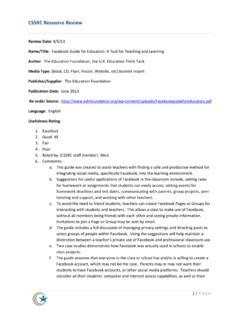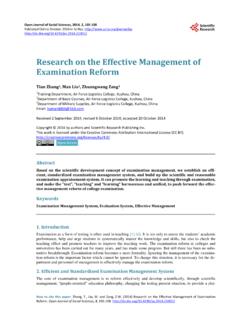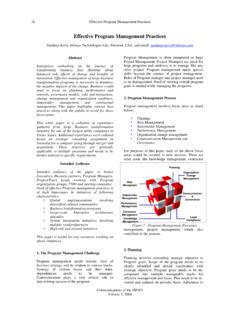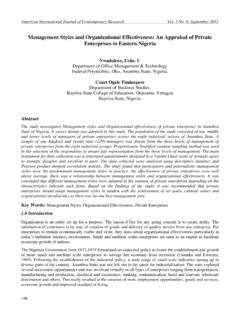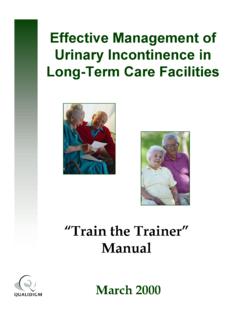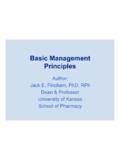Transcription of Effective Case Management - cdpsdocs.state.co.us
1 COACHING PACKET!"#" Effective case Management $%& '% ( )&*'&) +, -+(./'%0 1(.2&3) 4&)'0%&4 3+ ())')3 56*')4'.3'+%) '%3/&'789&7&%3(3'+% +,&,,&.3':& 8*(.3'. '99 )688+*3 ) )),69 +,,&%4&* +63.+7&)Author: Mark Carey, The Carey GroupEditor: Madeline M. Carter, Center for Effective Public PolicyDeveloped for the FY 2007 Prisoner Reentry InitiativeGrant Program, sponsored by the Department of Justice, Office of Justice Programs, Bureau of Justice Assistance and administered by the Center for Effective Public PolicyThis project was supported by grant number 2008-RE-CX-K001, awarded by the Department of Justice, Office of Justice Programs. Points of view in this document are those of the authors and do not necessarilyrepresent the official position or policies of the Department of Justice.
2 2010 Center for Effective Public Policy !"#$%&'( )#$*+, -+.&+/ 01 !.+#,&'( # 234+ ', 6". #' 766+$,&8+ 966+':+. ;++',.< -</,+= A Framework forOffender Reentry Establishing a Rational Planning Process Engaging in Collaborative Partnerships to Support Reentry!"#$%&'( )#$*+, -+.&+/ >1 ?+3&8+.&'( 78&:+'$+@2#/+: -+.8&$+/ Implementing Evidence-Based Practices Effective case Management Shaping Offender Behavior Engaging Offenders Families in Reentry Building Offenders Community Assets through Mentoring Reentry Considerations for Women Offenders !"#$%&'( )#$*+, -+.&+/ A1 7' '( B+#'&'(643 94,$"=+/ Measuring the Impact of Reentry Efforts Continuous Quality Improvement 2010 Center for Effective Public PolicyPage iTable of ContentsIntroduction to the Coaching Packet 1FY 2007 Prisoner Reentry Initiative (PRI) to the Effective case Management Coaching Contents of this Intended Audience for this to Use this to Seek Additional 6 Section I: Overview of Effective case Characteristics of Effective case Components of Effective case II: Effective case Management Coaching Packet III: Action Planning IV.))))
3 References and Additional 2010 Center for Effective Public PolicyPage 1 Introduction to the Coaching Packet SeriesThe Center for Effective Public Policy (the Center) and its partners, The Urban Institute and The Carey Group, were selected by the Department of Justice,Office of Justice Programs, Bureau of Justice Assistanceto serve as the training and technical assistance providers to the Fiscal Year 2007 Prisoner Reentry Initiative grantees(hereafter PRI grantees ). The project team served in this capacity from April 2008 toJune 2010. The Center is a nonprofit criminal justice consulting organization based in Silver Spring, Maryland. Since the early 1980s, the Center has provided training and technical assistance to the criminal justice field on a wide array oftopics, including transition and reentry, and has administered a number of national projects of this kind.
4 The Urban Institute was established as a private, nonprofit corporation in Washington, in 1968 and is a leader in prisoner reentry research, focusing on making best practice information accessible to practitioners and policymakers. The Carey Group is a justice consulting firm with extensive practitioner experience in evidence-based practices, strategic planning, community and restorative justiceand a part of its technical assistancedelivery to the PRI grantees, the Centerdeveloped a series of tools to assist grantees in specific areas of their reentry work. The final products of this work include elevenCoaching Packets in three series. These Coaching Packets offer practical value beyond the jurisdictions involved in this initiativeand are available to criminal justice professionals and their partners interested in enhancing their strategies forreducingrecidivism and improvingoffender Coaching Packet provides an overview of a specific topic as it relates to successful offender reentry, and offers tools and resources for thoseinterested in exploring the topic in greater depth.
5 Series 1provides a blueprint for an Effective offender reentry system. This series provides a conceptual framework for addressing prisoner reentry at the policy level; outlines a strategic planning process to support implementation efforts; and explores the establishment of successful collaborative partnershipsat the policy and case Management levels. Series 2addresses key issues related to the delivery ofevidence-based services to offenders. This series summarizes the key literature with regard to implementing evidence-based practices; explores advances in approaches to case Management ; addresses the important role of staffin changing offender behavior; and summarizes research and practice as it relates to working with women offenders, engaging families, and mentoring. Series 3provides guidance and tools to ensure that reentry efforts achieve their intendedoutcomes.
6 This series describes methods to assess the effectiveness of reentry effortsand offers strategies for achievingcontinuous quality improvement. 2010 Center for Effective Public PolicyPage 2FY 2007 Prisoner Reentry Initiative (PRI) GranteesThe Prisoner Reentry Initiative (PRI) intended to support the development and implementation of institutional and community corrections-based reentry programs to help returning offenders find employment and provide other critical services is a collaborative effort of the Department of Justice (DOJ), Office of Justice Programs, Bureau of Justice Assistance and the Department of Labor (DOL). Grants were awarded to state and local corrections agencies by DOJ to provide pre-release and transitionservices to offenders and were matched by DOL grants to faith- and community-based organizations (FBCOs) to provide post-release services, focusing on employment assistance and mentoring.
7 Thirty-five states received grants in three cycles of the Initiative during Fiscal Years 2006, 2007, and Of these, 23 FY 2007 PRI grantees received assistance under this project. FY 2007 grants were awarded in the fall of 2007 and implemented from 2008 to 2010; however, some grantees will not complete their activities until 2011. The FY 2007 grantees provided technical assistance under this project included: ALASKA, Native Justice Center ARIZONA, Criminal Justice Commission/ Yuma County Sheriff s Office CALIFORNIA, Department of Community Services andDevelopment COLORADO, Division of Criminal Justice Services/City of Denver DISTRICT OF COLUMBIA, Government FLORIDA, Departmentof Corrections HAWAII, Departmentof Public Safety INDIANA, Departmentof Corrections IOWA, Departmentof Corrections KANSAS, Departmentof Corrections MAINE, Departmentof Corrections MICHIGAN, Departmentof Corrections MINNESOTA, Department of Corrections NEVADA, Departmentof Corrections NEW JERSEY, Departmentof Corrections NORTH CAROLINA, Departmentof Corrections OHIO, Departmentof Rehabilitation and Correction PENNSYLVANIA, Departmentof Corrections RHODE ISLAND.
8 Departmentof Corrections TENNESSEE, Departmentof Corrections VIRGINIA, Departmentof Criminal Justice Services WISCONSIN, Departmentof Corrections WYOMING, Departmentof Corrections 1 The PRI program will end when the FY 2008 grantees complete their activities. 2010 Center for Effective Public PolicyPage 3 AcknowledgmentsBecki Ney, Principal, Center for Effective Public Policy, served as the PRI Training and Technical Assistance Program Project Director. Ms. Ney conceptualized and oversaw the development of the Coaching M. Carter, Principal, and Rachelle Giguere, Program Associate, Center for Effective Public Policy, served as the key editorsfor the Coaching Packet series. Ms. Giguere also provided extensive research support to the development of the thanksare extended to Peggy B.
9 Burke, Principal, Center for Effective Public Policy for her significant contributions to the early development of this Coaching Packet. 2010 Center for Effective Public PolicyPage 4 Introduction to theEffective case ManagementCoaching PacketC%+ !"',+',/ "6 ,%&/ )#$*+,This Coaching Packetprovides: A definition of case Management ; A description of the key components of an Effective case Management approach as well as their most salient features; Illustrations of some of these features; A tool to determine your jurisdiction s strengths and gaps in the area of case Management ; An aid todevelopingplans to address identified gap areas; and References to additional resourceson this + D',+':+: E4:&+'$+ 6". ,%&/ )#$*+,This Coaching Packetwas originally developed to assist grantteams that were established to manage local PRI initiatives.
10 The teams were composed of representatives frominstitutional and community corrections and faith-based or community organizationsinvolved in the delivery of pre- and post-release services to offenders transitioning from prison to the community. The content of these Coaching Packets has much broader application, however; the information and tools contained within this Coaching Packet can also be used by teams of criminal justice professionalsand their partners toassessthe status of their efforts inimplementing evidence-based practices and Effective reentry services to offenders. This Coaching Packet may also serve as a resource for professionals at all levels who are interested in learning more about this topic. F"G ," H/+ ,%&/ )#$*+,SECTION I: READ THE OVERVIEW ON Effective case section of the Coaching Packet provides an overview of the principles leading to Effective case Management ; and the features of preparing for the development of the case plan, the creation of a plan, supervising the case , and managing the case plan as the needs of the offender and circumstances dictate.
